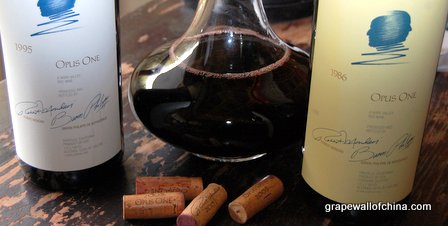By Jim Boyce
I met David Pearson, CEO of Opus One, and Yvonne Chiong-Mougin, the company’s Asia export manager, in Beijing yesterday to talk about the winery and its position in China. Pearson told me the company’s biggest market in Asia is Japan, with three to four times more volume than China, including Hong Kong, but there is strong and growing demand in this country. He also talked about everything from counterfeit wine to sales strategy. Here are some excerpts (my highlights):
On Opus One and counterfeits
This is a very large industry issue, one that predates [the recent growth of the wine sector in] China, and there is more concern about provenance — about what a wine is and where it has been.
At Opus One, we see relatively little counterfeiting. Our biggest problem is people that leverage our name and label. A company in Shenzhen is trying to do that now.
One school of thought, one to which I ascribe, is that counterfeiting is a sign a brand has reached an iconic standing. Most people who have the money and want to buy Opus One know where to buy it. The don’t buy it in a corner store….
So we are not panicking at Opus One about counterfeiting but we are taking some measures with our bottles. For example, starting in 2008, our back label has included an NFC chip, the next evolution of the RFID chip. You can scan the chip with a smart phone and it brings up a website to tell the consumer about the wine and verify its authenticity. When the bottle is scanned, our computer server creates a history of where the bottle has been. This does three things: it fights counterfeiting, it provides a provenance record, and it is a marketing tool.
On how Opus One sells wine abroad
In 2004, we changed from giving exclusivity to one or two distributors in a country to going through negociants [22 in all, who handle the flow of export wine from Opus One]. That year, 18% of our wine went to export, which is a lot by California standards. Now it is about 50 percent. We have a totally unique business model. It coincided with Hong Kong dropping its wine taxes and China increasing its demand, but it was driven by Opus One’s need to be recognized among the great fine wines of the world.
We don’t just sell to anyone with money but try to distinguish between people who want to be serious about wine as opposed to those who want to speculate. We could have had bigger volume in China, but we want to have fewer and better-established buyers. We had a guy here who wanted to buy 10,000 cases, but we politely declined. Wine has to be more than sitting on a label [as an investment] or [Robert] Parker points….
I remember on an early visit [in 2007] when an eager young reporter asked how many cases we were selling in China. I told her 50 to 75 cases and she was surprised [the number was so low]. She asked, “How many will you sell in the future?” I said maybe 200 to 250 cases.
Like the first growths [such as Lafite and Latour], we have limited production, so if we drive more Opus One into one market, we have to limit it in another. Our expansion in Asia has been very strategic.
[I asked why more Californian wineries haven’t followed Opus One’s lead and gone through negociants. Pearson said he had expected that to happen but says that negociants don’t create market demand — they respond to existing demand — and reasons that for many California wines there is no demand in international markets, while for others their volume is too small.]
On how Opus One differs from other Napa wines
A few things are very unique: most unique is that we only make one wine. Wine comes from an inner sense of what you’re doing. Opus One was created by Robert [Mondavi] and the Baron [Philippe de Rothschild] for a specific mission and we’ve followed it to the letter for 33 years.
In terms of style and expression, [in Napa] you find fully ripened, or over-ripened, rich and powerful wines, wines that lots of people like, Robert Parker among them. Others look for restraint and balance, and Opus One falls in that category with a small number of wineries.
We’re making a California wine that expresses the terroir and uses Californian and French wine making. We think this style allows wine to age gracefully. We had a tasting in Paris a few years ago of our first vintage, 1979, with about 60 wine enthusiasts and they were floored by it. The 1979 is still holding up.
Grape Wall has no sponsors of advertisers: if you find the content and projects like World Marselan Day worthwhile, please help cover the costs via PayPal, WeChat or Alipay.
Sign up for the free Grape Wall newsletter here. Follow Grape Wall on LinkedIn, Instagram, Facebook and Twitter. And contact Grape Wall via grapewallofchina (at) gmail.com.


For those interested the company providing the RFID/ NFC chips to Opus One is iProof, which now has an office in Shanghai.
great interview, but one thing Mr.Pearson said that kinda left a foul taste in my mouth is that (We don’t just sell to anyone with money but try to distinguish between people who want to be serious about wine as opposed to those who want to speculate)- i think great wine connoisseurs are bread from the cloth of speculation and then grom from that to serious wine enthusiast (which i hope to be , as i am learning and growing to respect and enjoy wine)